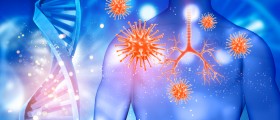
Even though many people live in ignorance and actually do not realize that flu and common cold are two different illnesses. Even though their symptoms and signs are quite similar, patients suffering from flu seem to become sick more suddenly, they generally look more ill and feel much weaker comparing to individuals dealing with common cold.
Flu represents an acute respiratory infection, affecting the upper respiratory tract (the nose and throat) and may occasionally spread to the lungs. The infection occurs in a widespread fashion each late fall and early winter while individuals cases occur throughout the year.
Flu - Symptoms and Signs in Adults
Symptoms of flu occur and develop suddenly and rapidly. The first thing is fever. High fever is generally bothering these patients and is accompanied by severe aches and pain in joints and muscles. headache is another complaint of these patients. Many individuals locate the pain around the eyes. There is also generalized weakness, the skin becomes warm and flushed and eyes watery. After a day or two one develops dry cough. The throat may become sore while some people also report watery discharge from the nose.
Although many people seem o stay at home once the mentioned health issues occur and take care of themselves, some of them with more severe symptoms and signs are due to consult their health care provider. This especially refers to patients in whom symptoms linger for more than 5-7 days without any relief, those with body temperature above 102 ° F (38.8 ° C) and severe shortness of breath.
Furthermore, people at risk of developing complications from flu are also due to consult their doctors. These include patients with chronic illnesses (heart, lung, kidney diseases, diabetes, HIV/AIDS etc.), pregnant women, residents of nursing homes and similar facilities and elderly individuals (older than 65 years).
As far as complications of flu are concerned, many additionally develop sinus or ear infections, bronchitis and pneumonia. The most common complications associated with flu are dehydration and inability to drink fluids, coughing blood, breathing difficulty accompanied by cyanosis and worsening fever. Return of fever, cough and other symptoms in the second week after the onset of infection are also a reason for one to worry because they signify some complications as well.
Flu in Adults - Treatment
All patients are advised to stay in bed, drink plenty of fluids and fruit juices and eat clear soups. there are certain commercial products containing optimal amount of electrolytes mixed with water which are an excellent choice for proper hydration of the body while having flu. Diet should be light but rich in vitamins and minerals.
Aches and pains are brought under control with OTC medications like acetaminophen and ibuprofen, both of which can also deal with increased body temperature.
Doctors may additionally prescribe cough suppressant or expectorants. Breathing difficulty improves with steam inhalations. And finally, cough and sneeze into a disposable soft tissue and stay away from other people in order not to make them sick too.

















Your thoughts on this
Loading...